Arthur
Brown, Atomic Rooster and Andromeda
Albums reviewed
on this page: The Crazy World of Arthur Brown,
Andromeda, Death Walks
Behind You, In Hearing Of, Made
in England.
The Crazy World of Arthur
Brown: Arthur Brown (vocals), Vincent Crane (organ,
piano), Drachan Theaker (drums), Sean Nichols (bass),
although it appears Nick Greenwood (bass) and John Marshall (drums)
also may be involved. Theaker and Nichols were out fairly quickly,
replaced by Carl Palmer (drums).
Andromeda: John Du Cann (vocals, guitar), Mick
Hawksworth (bass, vocal), Ian McLane (drums).
Atomic
Rooster: Vincent Crane (organ, piano), Carl Palmer (drums),
Nick Graham (bass). Palmer quit, replaced by Rick Parnell
briefly, then Paul Hammond (drums). John Du Cann
(vocals, guitar) added, then Graham quit. Vocalist Pete French
added, 1971. Du Cann and Hammond leave to form Bullit in 1971,
then French leaves in 1972. Final line-up that we care about: Crane,
Rick Parnell (drums), Steve Bolton (guitar), Chris
Farlowe (vocals), and Bill Smith (bass), although Bolton
leaves in late 1972, to be replaced by John Mandella (guitar).
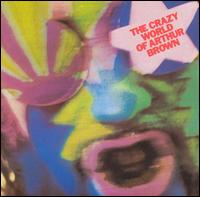 The
Crazy World of Arthur Brown (1968), ****
The
Crazy World of Arthur Brown (1968), ****
Somewhere
in England a nuclear accident occurred in the mid-60s, and ordinary
club R&B/jazz musicians were transformed into mutant musicians
with psychedelic powers. Singer Arthur Brown gained a fantastic
intensity and range, becoming a vocalist transcending almost all
others. He could be a expansive as Ethel Mermen, or soft and
soothing, then raving like a lunatic, or burst into an astonishing
falsetto vibrato. Organist/pianist Vincent Crane played his parts
with a skillful dementia, and without relying on any of the gimmicks
used by Keith Emerson. Drummer Drachan Theaker was only affected to
the extent that he tried to play like Ginger Baker, but cannot
successfully execute it, losing his timing in the fills. (Bassist
Sean Nicholas seems to have acquired the ability of infrequent
usage). The result is music that was as heavy as you could get
without a guitar, or light and whimsical, and immensely creative
psychedelia. Brown's lyrics are quite excellent throughout: a cross
between a revival preacher's sermon and an acid freak, with a good
cadence to them. Even though these images are rather striking, his
lyrics have an undercurrent of Biblical references as well ("Come
and Buy" or "Spontaneous Apple Creation"). In other
words, he was a modern William Blake with a theatrical bent large
enough to blow all the album's earnings.
As
for the music, the first side of Crazy World is a loosely a
story about an acid trip. An acid trip where Brown meets the devil,
which can only lead to bad things. This is set up with
"Prelude-Nightmare," which sounds like a jazz/R&B trio
becoming enthusiastically demonic, as Brown introduces his insane
falsetto. Incidentally, this falsetto was a direct precursor to
almost all heavy metal singing - Ian
Gillan's famous delivery is almost certainly copied from Brown.
This track leads into the wonderful "Fire Poem" where Brown
starts out talking normally, but the lyrics rapidly become
psychedelic and surreal, and his vocals become accordingly hysterical
and paranoid. Of course, all it does is set up the infamous "Fire."
The
quintessential Brown track, "Fire" features him screaming
"I AM THE GOD OF HELLFIRE" as a introduction, and
demonstrates the intensity and range of his vocal delivery: one
minute he soothingly advises the listener that "all of it's
going to burn" and the next he's crazily shouting "you're
gonna burn, BURN BURN BURN." The track is everything good about
this album - Brown's hypnotic and flexible vocals and Crane's driving
organ work and smart arranging. A nice combination of batshit
insanity, aural bi-polarity, and catchy music. It was also a hit in
the UK and the US. The rest of the story (featuring reprises of the
"Fire" burning) with "Come and Buy" and
"Confusion" are comparative letdowns, saved by Brown's less
frequent vocal histrionics. Still, even in these less inspiring
songs, the band's smarts show up in smart writing/arranging, with
changes in pace, and good instrumentation ("Confusion"
opens with an organ/xylophone pairing, for example).
Still,
Brown's vocals make the album, and even more so on its second half.
His cover of Screamin' Jay Hawkins' "I Put a Spell on You"
is the sort of performance for which the song cries. He alternates
between informative and downright creepy, especially when it sounds
like he is arguing with himself to "stop it! STOP IT! stop it!"
Crazy World's other cover is a straight version of James
Brown's "Money," where Brown gets to air his voice out. In
other places where he becomes more quiet, Brown sounds more
explanatory than untrustworthy (the excellent R&B song "Rest
Cure"), while in "Fire" his soothing voice is akin to
a stranger with candy. "Spontaneous Apple Creation" is a
bit of a happy psychedelic cheesecake with Brown narrating and
singing a bit of nonsense containing one of my favorite lines "and
3000 people ate one strawberry." The song is so light, it makes
me think of bright colors and dancing cartoons. Only "Child of
My Kingdom" is a relative clunker, and strangely cops the James
Bond theme.
Produced
by Kit Lambert, with Pete Townshend as "Associate Producer,"
this was the only album released by this line-up of the Crazy World,
with Theaker getting replaced by Carl Palmer. Then Crane and Palmer
split to form Atomic Rooster. Brown later regrouped with the rarely
heard Kingdom Come in the early 70s, before embarking on a varied
solo career, sometimes interacting with Crane and Theaker. However,
this album is unrestrained, and intensively creative, providing a
fascinating glimpse of the late 60s.
The Crazy World of Arthur Brown,
Strangelands (rec. 1969?, rel. 1988)
Either
a second album with the band or solo. Either way, not released until
much later.
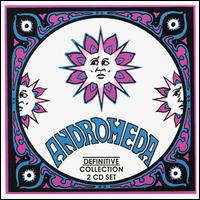 Andromeda
(1969), ****
Andromeda
(1969), ****
While
Crane and Palmer were still backing Brown's madness, future Atomic
Rooster guitarist John Du Cann was leading this underground band.
Usually when liner
notes use the term "underground group" it's code for "group
that never had any success and didn't deserve any," but
Andromeda deserved better than they received. This was the time
when heavy psychedelia and blues really crossed over into the
beginnings of early metal, and while Cream was all over the charts
with a mixture of the first two, they never went down the metal path.
Fellow power trio Andromeda did, releasing this album after Cream
broke up, although Andromeda had been around since early 1968.
As for the music, Andromeda is an enduring combination of
blues, jazz, metal, and Holst's The Planets, based around the
talents of John Cann. The guitarist and singer wrote almost all
of the songs and he shows a real talent for constructing multi-part
songs with completely different sounds and tidy transitions to link
them ("Turns to Dust", "Return to Sanity", "When
to Stop"). But his guitar work really drives the album: he
tosses off riff after amazing riff, frequently overdubbing multiple
lines in the same song, and even cranks it up to full-blown metal
(the "Determination" part of "Turns to Dust" is
just one example). Bassist Mick Hawksworth is with him every
step of the way, with some amazingly deft bass work to match Cann's
fleet fingers ("Too Old"). Drummer Ian McLane is the
lesser member, as his drumming style belongs more to the 60s than the
whole Bonham/Baker/Paice large sound trend. But he can be a
real basher when appropriate, and is more than adequate. In keeping
with the times, Andromeda is not all blues and metal; it has a
well-thought out classical element also, usually in the form of
musical quotes from The Planets ("Return to Sanity,"
"Day of the Change"). This album has a touch of
Quicksilver
Messenger Service as
well, in both the backing vocals, and the traditional Spanish guitar
in "When to Stop" (the only acoustic guitar on the entire
album - this is mainly a ROCK album). Andromeda's lesser
facets are the cheap production --McLane's drumming is for the most
part unmixed-- and Cann's lesser, but still good, jazzier almost-pop
songs ("And Now the Sun Shines", "I Can Stop the
Sun"). Whatever shortcomings, the writing and the playing
more than make up for it; Cann might have been the best of the
"second-tier" guitarists based on this album alone.
Some music is meant to played out loud, and this is a good example.
Andromeda broke up after Cann joined Atomic
Rooster, which found actual success. Produced by the group,
with Eddie Offord as the engineer.
The album has
been reissued in a couple of different formats, all with bonus tracks
that are arguably just as good as the album. My edition has
both their only single Go Your Way/Keep Out 'cos I'm Dying,
as well as some unreleased songs that are fantastic ("Let's All
Watch the Sky Fall Down", "See Into the Stars").
The version that is in-print as of right now is actually a two-CD
collection with even more unreleased material, and alternate takes.
Atomic Rooster
(1970)
Their sole album with Carl Palmer on drums.
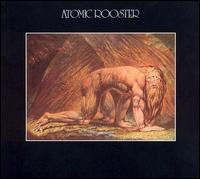 Atomic
Rooster, Death Walks Behind You (1971), ***
Atomic
Rooster, Death Walks Behind You (1971), ***
This
was Atomic Rooster's second album, after Arthur
Brown organist Vincent Crane absconded with the Brown's tour
drummer Carl Palmer to make a new band.
(Police report a bassist was also involved.) After their debut,
Atomic Rooster, Palmer was tagged to play with a different
grandiose keyboardist, becoming the P in ELP. Crane then brought on
board former Andromeda guitarist
John Du Cann (alias John Cann), while the band's bassist departed.
(Anyone with information on his whereabouts should contact police).
Combining
Crane and Du Cann sounds ideal. Crane was usually the gas jet to
Arthur Brown's flame, providing most of the Crazy World's musical
underpinnings and additional creepiness. (Du) Cann was a guitarist
who could spit out twisty riffs with great speed and decibel levels,
as he did with Andromeda and drummer Paul Hammond is a very, very
good athletic drummer as well - closer to Palmer in style than other
hard rock drummers like John Bonham. Together, the band has a very
dark, very hard sound. Death Walks Behind You opens with the
deliciously malicious sounds of Crane's piano stalking downward, then
Cann kicks in the song's main riff. Brown told his listeners that
they were going to burn, but this is a more compact version of that
same version of hellfire and brimstone. Cann sings of paranoia, doom,
hell, as the song builds and builds towards . . . nothing. Andromeda
fans know this is the moment for Cann to kick in the amazing soloing,
but the song's middle is anticlimactic: Cann needles the golden riff
some more and Crane has a piano interlude. Sure the sound is great,
but in the end - nothing. The same problem plagues Cann's "I
Can't Take No More," a good rock song completely deflated by an
oddly lame chorus. As Cream once remarked, what a bringdown.
If
only there were some high commandment, some overpowering figure to
say to Atomic Rooster: "Go Forth and Rock." For Rock, they
surely could. Both Cann and Crane liked to overdub themselves, and
between them they could have created some great pyrotechnics. At
best, Cann and Crane only trade ass-kicking solos once, on "Seven
Streets," which is not great otherwise. Cann only reaches his
potential on "Sleeping for Years," where he piles on the
guitars before slashing through the rest of the great song. Instead,
the Rooster gets turned around in other contemporary trends. "Vug"
is a take on prog-rock, with Crane adding some soul organ. The prog
crops in other places as well, such as "Gershatzer," which
see-saws between rock and slower keyboard sections. The band's hit
single, "Tomorrow Night" is cock-rock, based a distinct
beat rather than any explosive soloing, and discussing the need to
"do it right, tomorrow night." Aside from "Sleeping
for Years" the only other really strong track is "Nobody
Else" which is mainly a moody piano ballad. Every dark bands
needs one of these - the slow depressing, painfully introspective
track. Even though they had their moments of devastating metal, the
band seemed to define their sound a bit too broadly. The highs are
high, but the mediocres make up the bulk. Produced by the band.
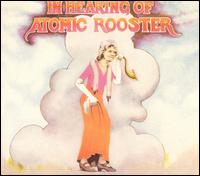 In
Hearing of Atomic Rooster (1971), *1/2
In
Hearing of Atomic Rooster (1971), *1/2
You
remember how Deep Purple wound up with a crappy vocalist and turned
from kicking ass to making hard rock nonsense? Well, Atomic Rooster
did it first! New singer Pete French was the standard soul-based hard
rock vocalist, but also comes with a distinct accent (like Steve
Marriott's, perhaps?). He could be a successful screamer, but the
band rarely rocks hard enough for him to make the effort. Everything
is slowed down, less intense, and Cann's guitar solos have all but
disappeared. In Hearing of is dominated by the new soul or
vaguely funky sound, and the band only has a handful of interesting
ideas. Hardly anything on this album is worth recommending. The
proggish instrumental "A Spoonful of Bromide Helps the Pulse
Rate Go Down" has a nice central riff, and "Head in the
Sky" is a half-hearted Cann track. Other than that.... well,
somehow Cann's "Devil's Answer" became a Top Lordy! Five
hit in the U.K., but its odd mix of added horns, French's obnoxious
"sing!" before the chorus, make it only slightly less empty
than the rest of the album. The band's dark lyrics are still present,
so perhaps they were hoping the music's glacial pace would reflect
their myopia ("The Price", "Black Snake"). Boring
hard rock, and it is little wonder that Cann and Hammond left and
formed a new band after this album. The album also boasts
uncharacteristic Roger Dean cover art, displaying an elderly women
fleeing in horror from the band, who were secreted inside of an ear
trumpet. Produced by Crane and the group.
Kingdom
Come, Galactic Zoo Dossier (1971)
Brown's new crazy
progressive band.
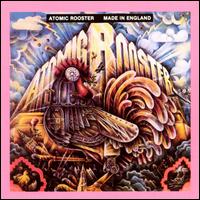 Atomic
Rooster, Made in England (1972), *
Atomic
Rooster, Made in England (1972), *
Even
worse than In Hearing Of, Atomic Rooster made all the same
mistakes, but more abundantly and intensively, with Made in
England. Almost every track follows the In Hearing Of's
formula: slow rock with funky beats, with Crane placing classical or
progressive flourishes on top. This approach's faultiness is only
enhanced by the group's lineup changes, as Du Cann, Hammond, and then
French left. None of their replacements were as good. New guitarist
Steve Bolton lacks Du Cann's rapid-attack capabilities, instead
utilizing wah-wah ("Stand by Me"), Shaft-style
rhythm playing, or standard bluesy hard rock leads ("Never to
Lose", "Space Cowboy"), making the band sound
conventional. He never rivals Crane for the band's center, only
tossing out solos occasionally and playing rhythm otherwise. Singer
Chris Farlowe is a huge liability. Some singers are bad and know it.
Lee Jackson was downright terrible, but you
always felt like he knew he was terrible. The problem with Farlowe is
that he was a bad singer who thought he was good. A product of soul
and R&B, his singing on Made in England ranges from
annoying to downright ludicrous. When he isn't overworking his lungs,
he sounds like a creepy soul singer ("Time Take My Life"),
but those instances are rare; his frequent vocal affections and
histrionics are atrocious ("Stand By Me', "Little Bit of
Inner Air"). Crane has not changed much; his playing is his
usual downcast classical-influenced work, even if his lyrics are more
depressed than ever ("Don't Know What Went Wrong", "People
You Can't Trust" which borrows its intro beat from "Tomorrow
Night", "All in Satan's Name", "Never to Lose"
among them). On many albums you can ignore the bad music, and here
the best tracks are the ones you can ignore. Others are comically bad
(could anyone take "Space Cowboy" seriously?) or actively
bad ("Stand by Me" sounds like a extremely crappy Argent,
"Little Bit of Inner Air"). It takes a lot to make a track
actively bad, where it becomes annoying to even listen or hear it. A
move towards mainstream rock somewhere near Argent,
but a gamble which did not pay off. None of these tracks were
released as an A-Side, and the album failed to chart. Produced by
Crane.
Kingdom Come (1972)
Atomic Rooster, Nice 'N' Greasy
(1973)
Kingdom Come, Journey (1973)
The
band used a drum machine on their final album.
Dance with Arthur Brown
(1975)
Fire!
on the Music Page...
 The
Crazy World of Arthur Brown (1968), ****
The
Crazy World of Arthur Brown (1968), **** Andromeda
(1969), ****
Andromeda
(1969), **** Atomic
Rooster, Death Walks Behind You (1971), ***
Atomic
Rooster, Death Walks Behind You (1971), *** In
Hearing of Atomic Rooster (1971), *1/2
In
Hearing of Atomic Rooster (1971), *1/2 Atomic
Rooster, Made in England (1972), *
Atomic
Rooster, Made in England (1972), *